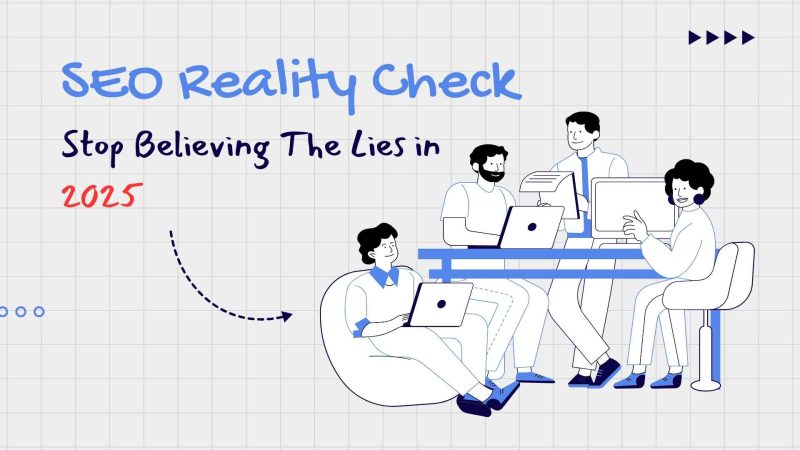SEO has evolved—dramatically. Yet, many marketers and business owners are still playing by old rules and hoping that those tactics will still produce good results as they did before.
These myths have circulated so widely and so often that they’ve put a blanket on truth. But the reality is: algorithms of Google have shifted dramatically in a few years and clinging to these outdated beliefs are not just unproductive but can also damage your rankings.
If you’re committed to staying competitive in 2025, it’s time to debunk those lies that keep your rankings roar high.
In this blog, we will talk about 8 common SEO myths and lies that you might have accepted as truth at one point. But, in 2025 you will dispel those myths and actually do the work that really influences your SEO success.
Let’s get started.
Lie #1: AI-Generated Content Gets Penalized by Search Engines
Ever since ChatGPT launched in November 2022 and the internet has been flooded with AI-written content.
Businesses that never even thought about publishing blogs on their website suddenly had a “content strategy” and started publishing 2-3 blogs a day. Why wouldn’t they with ChatGPT writing content become super easy. No plagiarism, better writing than most writers, generate content in seconds for free. It led thousands of websites to pop up overnight and pump out AI-generated articles like there was no tomorrow.
And at first? Google favored those sites, their pages ranked and traffic soared. It was an SEO gold rush.
But then… BAM! Google’s Helpful Content Update (September 2023) came, and suddenly, those same sites saw their traffic going downhill. We’re talking about getting millions of visitors down to just a few hundred. Brutal.

So does this mean AI content is the enemy? Nope!
Google’s helpful content guidelines say: “We reward high-quality content, however it is produced.”
Means: For Google, AI content is not a problem but low-value, repetitive, recycled, mass produced content that doesn’t help users is. If your AI-written blog is just repeating the same boring stuff as everyone else, Google will bury it.
Reality: AI Is a Tool—But Quality is King
AI can help you create incredible content that search engines will love as long as it’s not uninformative and uninteresting, useless, or unoriginal.
Because:
Search engines reward value. If your content helps people, it wins—whether written by a human or AI.
Originality matters. Google doesn’t want 10,000 versions of the same generic article. You need to make your Stand Out by adding your experiences, knowledge, case studies and anything that makes it informative for users.
AI is best used as an assistant, not a replacement. Use AI to speed up your research but make sure your content is assisted and written by you which actually helps the reader.
Lie #2: Social Media Signals Directly Influence SEO Rankings
Optimizing social media channels for likes, shares, and followers sounds like a perfect recipe for boosting SEO, right? Well not really! This belief has been floating around for so long that it made it sound like a solid fact.
Even Back in 2014, Matt Cutts, a former Google engineer made it clear that social media metrics—like retweets, likes, and follower matters but they do not directly affect how your site ranks in search results.
It’s because social media platforms are constantly changing. Millions of posts pop up in a second, profiles get updated daily and Google simply can’t keep up with indexing every tiny shift.
So, if you have been putting all of your time and efforts into posting social media posts in hope of getting top spot on Google. Here’s your wake-up call: these “Social Signals” won’t directly push your site up the search engine ladder.
Reality:
But hold up—don’t stop posting on social media yet. It still plays a crucial role in your SEO strategy.
Here is how:
- Drives Traffic: Every time someone clicks on your shared link, it’s a visitor who is heading to your website. More visitors can improve your site’s authority and relevance in Google’s eyes.
- Build Backlinks: If you create amazing content which is valuable and shareable. Industry experts might link to it from their own sites. This way you can earn high quality backlinks which are crucial.
- Boosts Engagement: Social media keeps users interacting with your brand longer which signals Google that your content is relevant and engaging to the target audience.
Bottom line? Social media doesn’t directly influence your rankings but it amplifies your content’s reach. This is how it indirectly leads to better SEO performance.
Lie #3: Backlinks are the Sole Key to Higher Rankings
Past Reality: In the early days of SEO, the mantra was simple: “The more backlinks, the better.” and SEOs used to make hundreds of links such as profiles, classifieds, forums and more without regard to quality. Quantity reigned supreme,and even low-quality or “shitty” links used to propel a site to the top of search results.
Today’s Reality: Google, recognizing the manipulation and began refining its algorithm to prioritize link quality over quantity. The shifting moment came with the introduction of the Penguin update in April 2012. This update specifically targeted sites engaging in spammy link practices and penalized those with unnatural link profiles.
Subsequent updates have continued to emphasize the importance of high-quality, relevant backlinks. Today, search rankings are influenced by a multitude of factors including content quality, user experience, and technical SEO. Therefore, nowadays relying solely on backlinks, especially sources from where it’s easy to get links is not only outdated but can also lead to significant penalties.
Best Backlinks for SEO Success
Not all backlinks are equal—Google prioritizes quality over quantity.
Here are the ones that actually matter:
- Editorial Backlinks – Earned naturally when top sites reference your content.
- Guest Blogging Links – From high-quality, relevant sites (not spammy guest posts!).
- Business Profile Links – Google My Business, Yelp, and niche directories.
- Webinar & Free Tool Links – Create valuable resources people want to link to.
- Acknowledgment Links – From sponsorships, donations, and collaborations.
- Badge Backlinks – Award badges others proudly display (with a link to you).
- Link Roundups – Get featured in “Best of” blog posts.
- Broken Link Building – Replace dead links on authority sites with your content.
Lie #4: SEO is All About Your Website
Many businesses operate under the illusion that enhancing search visibility revolves solely around optimizing their website. They pour resources into on-page SEO, believing it’s the golden ticket to online success.
Reality:
In today’s dynamic digital world, focusing exclusively on your website is like fishing with a single hook in the ocean. Users are now looking for information across various platforms—Google, TikTok, Reddit, YouTube, and even AI powered search platforms such as ChatGPT, DeepSeek, Gemini and more. Relying solely on traditional SEO means missing out on these diverse avenues where potential customers are active.
Because, younger audiences are increasingly turning to platforms like TikTok and Instagram for information, often bypassing traditional search engines. This shift indicates that businesses need to be present where their audience is active, not just on their own websites.
Moreover, Google is also frequently launching core updates due to advancements in AI, which have led to significant fluctuations in search rankings. Even websites with amazing SEO execution and high-quality content have experienced downfall. This volatility underscores the importance of not putting all your eggs in one basket.
By diversifying your digital presence across multiple platforms, you can not only enhance your reach but also bolster your brand’s visibility. This comprehensive approach can lead to increased brand searches, which, in turn, contribute to higher rankings on search engines.
Lie #5: More Content Equals Better SEO
Among SEOs, it’s a persistent belief that piling up content on websites will skyrocket their SEO rankings. This misconception has led many to prioritize quantity over quality and creating crappy content.
Reality
Google’s March 2024 Core Update directly focused on low-quality, unoriginal content which rollout led to a 45% reduction in such material appearing in search results.
This move underscores Google’s commitment to rewarding content that offers genuine value to readers.
Moreover, the super popular “skyscraper technique” that includes crafting lengthy content to outdo existing articles has also lost its luster.,This technique used to work earlier but after being popularized this approach has been overused and now it can lead to diminishing returns. Today’s readers and search engine algorithms favor content that is concise, easy to understand, insightful, and directly addresses user intent.
To know how you should create content in 2025, follow the below guidelines:
- Original & Insightful: No regurgitated AI fluff. Content should bring new insights, real data, or expert opinions. To make it even better, check out these content optimization tips.
- Concise & Intent-Focused: People don’t have time for long guides. They want content that answers questions quickly, clearly, and thoroughly.
- Engaging & Well-Structured: Create content with easy-to-read formats with headings, bullet points, and short paragraphs. Because, no one likes reading a wall of text.
- Multi-Platform Friendly: Not only for Google, also make repurpose content for TikTok, Reddit, YouTube, and AI search tools.
- UGC (User-Generated Content) Matters: Google values authentic engagement. Encourage reviews, discussions and community-driven content for better credibility and reach. Check out these UGC content strategies to level up your content game.
- Updated & Relevant: The internet moves fast. Regularly update content to keep it fresh and valuable. Use these strategies to refresh your old content to level up your SEO.
Lie #6: The Higher the DA/DR, the Better the Backlink
This myth has been around for years, yet many SEOs and businesses still believe it. They focus entirely on Domain Authority (DA) and Domain Rating (DR) when securing backlinks, without considering relevance, traffic, page indexation, or backlink quality.
That’s why you see services on Upwork, Fiverr, and other marketplaces claiming:
- Increase your DA from 0 to 70 in one month
- Get high DA backlinks for cheap

The Reality
These shortcuts often do more harm than good. And, they achieve this by using 301 redirects links, profile links, forum backlinks, and even .edu links. The DR looks good just for seeing on tools like Ahrefs and others but in reality, these links don’t help your rankings.
Here’s why:
- 301 Redirects from Expired Domains – Sellers buy old domains with existing DA/DR and redirect them to your site. Your DA may rise quickly but Google recognizes these tricks and can devalue or penalize your site.
- Forum & Profile Links with High DA – Just because a website has a DA of 80+ doesn’t mean your backlink is valuable. Many of these pages never get indexed.
- Edu Domain Links – While .edu domains can be powerful, most services sell links from profile pages that Google doesn’t even index. If it’s not indexed, it doesn’t pass any SEO value.
How to Spot a Low-Quality Backlink Before Buying
Before taking a backlink, always check:
– Does the site have real traffic?
– Is the linking page or recent pages indexed in Google?
– Does the site have a natural backlink profile?
If the answer is no, the link won’t help your SEO—and may even harm it. Avoid building links like these.
Lie #7: Schema Markup Helps Your Page Rank
There’s a long-standing belief that adding schema markup will automatically push your page higher in search rankings. Many SEO guides and marketers emphasize the importance of structured data which makes it sound like a direct ranking factor. But it’s not.
The Reality
Schema markup does NOT directly influence rankings. Google and Bing have shifted focus away from structured data for understanding page content. Just as meta keywords became obsolete, schema abuse (fake reviews, keyword-stuffed FAQ schema, etc.) has made search engines less dependent on it. Instead, today’s search engine algorithm relies on AI-driven content analysis using advanced language models, HTML5 elements, and contextual relationships.
When Schema Markup is Still Useful
Even though it won’t boost rankings, schema can still add value in certain cases:
- Local Businesses – Helps display business details like opening hours and reviews in search results.
- E-Commerce Sites – Enhances product listings with price, availability, and star ratings
- Event Pages – Displays event dates, venues, and ticket availability.
- Recipe Blogs – Shows cooking time, ingredients, and star ratings in search results.
Lie #8: SEO is Dead
Every time Google rolls out an algorithm update, the digital marketing world erupts with cries of “SEO is dead!”, “SEO is dying”.
Reality:
SEO Is Alive and Thriving. Despite these perennial proclamations of its demise, SEO is not only alive but evolving. Each time Google updates its algorithms, it’s not to kill SEO but to refine it. Search engines have always been emphasizing on quality content and user experience. The claim that SEO is dead often stems from misunderstandings of Google’s evolving algorithms. Each update is aimed at improving user experience by prioritizing relevant, high-quality content.
In fact, SEO has become more sophisticated, focusing on delivering valuable content that meets user intent.
So, the next time someone tells you SEO is dead, just smile and hand them a shovel for digging into the latest SEO strategies, Of Course!
Final Reality Check: Adapt or Fall Behind
SEO in 2025 is about staying sharp, adapting, and focusing on what truly works. The businesses that thrive aren’t the ones blindly following myths but are the ones that test, learn, and evolve with each algorithm update.
Google’s algorithms are smarter than ever. It prioritizes real value, relevance, and user experience over gimmicks. That means quality content, strategic backlinks, and strong on-page fundamentals will always win in the long run.
So, ditch the SEO lies and do what actually works. Use Serpple SERP Ranking Tool to track your rankings with precision and confidence. Get daily updates, uncover new keyword opportunities, and make data-driven decisions that push your site higher in search results.
Published by
Adam White
Adam White is a 20+ year SEO professional who has optimized over 400 websites, built and sold over 20 internet and SaaS businesses all with SEO as the main traffic source. Follow him on Twitter/X
All stories by Adam White



Pingback: Homepage